Port Carling, Ontario, Canada
Architect: Tom McBroom (1997)
6,985 Yards, Par-72
Rating/Slope: 73.1/135
My Quick Review: With some odd routing choices, a dull set of greens and anti-strategic bunkering, it is easy to see why Lake Jo's ranking has dropped.
My Thoughts
The Lake Joseph Club was named the 'Best New Course in Canada' in 1997 by Golf Digest Magazine and in the following year was ranked in the top-10 courses in the country by Score Golf Magazine. Since receiving this national acclaim, the course seems to have lost favour with panelists as it is now outside of Score Golf's top-100, and is in the bottom-five courses among Golfweek Magazine's Best Modern Courses in Canada.
So, why the precipitous drop in the rankings? I attribute it to a very awkward routing, a dull set of greens, poor hole variety and bad bunkering. The real question is how did panelists ever see this as a top-10 course? I really have no idea. There is only a single great view (from the 9th tee) and there are but a few thrilling shots (approaches at the 2nd and 9th and the tee shot at the 8th); I expect that on repeated plays by panelists and on first plays by panelists after Lake Jo received it's high ranking, disappointment was very common.
The Routing
I was critical of Muskoka Bay Club because of Doug Carrick's routing choice to 1) emphasize play from elevated tees, and 2) to find the best golf holes at the expense of a comfortable, walkable routing. The same can be said of Lake Joseph. I do not know what restrictions (environmental or otherwise) were placed on McBroom when designing Lake Jo, but it is clear that he wanted to have tee shots played from elevated, 'dramatic' locations. As a result, long and uphill transitions are commonplace at Lake Jo. Transitions from 2-3, 3-4, 4-5, 6-7, 8-9, 13-14, 14-15, 15-16, and 16-17 are all uphill, and in several cases more than 100 yards long.
The Greens
Unlike McBroom's set of greens at Rocky Crest which are varied in size, shape, contour and demand all types of shot requirements, the greens at Lake Joseph are, for the most part, circular, tilted back-to-front and require an aerial approach.
Bunkering
Clublink Corporation has recently completed a bunker renovation at Lake Joseph, replacing the original darker sand with a much whiter sand. Well, the renovation was effective, as I can't say I've ever taken much notice of the course's bunkering in the past, but I sure noticed it in my most recent round... I was not impressed.
The bunker shapes are a mix-and-match of styles; I saw some Thompson flair, I saw some MacKenzie edging, and mostly I saw uninspired blobs.
This bunker looks like it could have been plucked from the excellently restored bunkering at St. George's...

While this bunker could be found at Dr. Mack's Cypress Point...

But mostly the bunkers look like this...
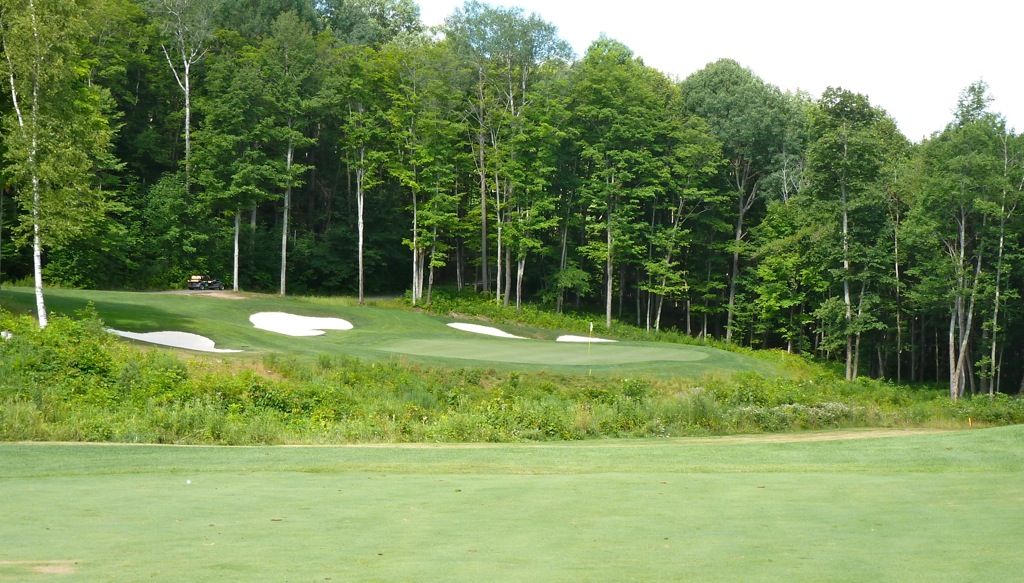
Or this...
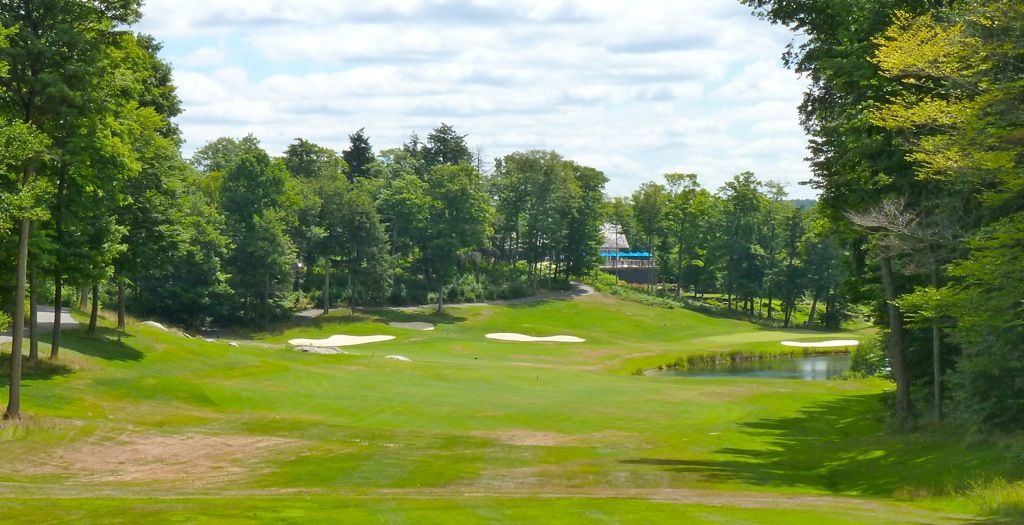
And are nothing more than poorly shaped blights upon the landscape.
I was also critical of McBroom in my review of King's Riding Golf Club in which I wrote that McBroom would have been well-served in using some restraint in both his routing and his use of man-made features. This is something I find over and over from McBroom. His desire to impose penal features on the landscape and to do so in volume is a trait I dislike. For example, the green site at the 13th is a wonderful one, set naturally on a small shelf some 30 feet above the fairway. For many, especially given the severe false-front, this approach is plenty difficult, and at most a single well-placed green side bunker was needed, but McBroom instead cluttered the green site with a series of 4 bunkers that are entirely penal in nature...
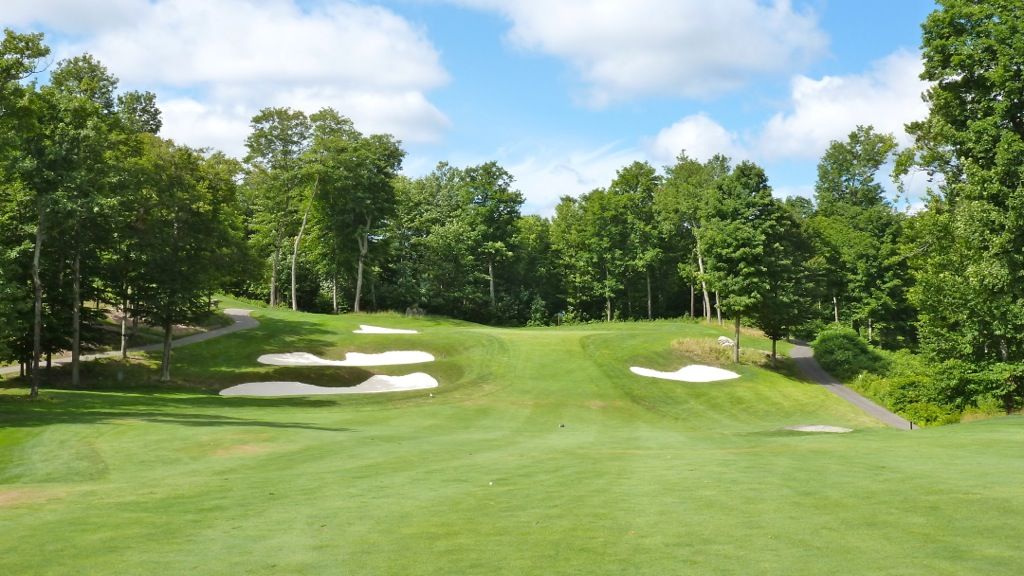
The theme of penal bunkering is found throughout the course. From the fairway bunker at the 2nd to the left green side bunkers at the 8th to the short green side bunkering at the 15th and 17th, the bunker placement adds little interest to the golf course.
Holes to Note
All Photos and Yardages will be from the 6,616 Yard Blue Tees unless otherwise noted.
The round is started with a demanding tee shot played from an elevated tee to a fairway surrounded by woods left and woods right. The site of the first tee will never be noted among the world's best, set between the clubhouse roundabout and the parking lot.

The second hole is a controversial one, with a forced lay-up tee shot to a blind landing zone. Anti-strategic bunkering guards the outside of dogleg on this already demanding tee shot.

Most approaches are from 160 yards+ and the demands on the golfer are high; the approach is all-carry to a small-ish green set on a small plateau.


The 555 yard, par-5 3rd was clearly a chance taken by McBroom. While the tee shot is straightforward (though a miss on either side is a lost ball), the 2nd shot is a controversial one, played blind over a duo of bunkers to a wildly undulating fairway at an angle to the line of play. It is not uncommon for a seemingly well-struck second shot to not be found. The view from the fairway:

and the lay-up area...
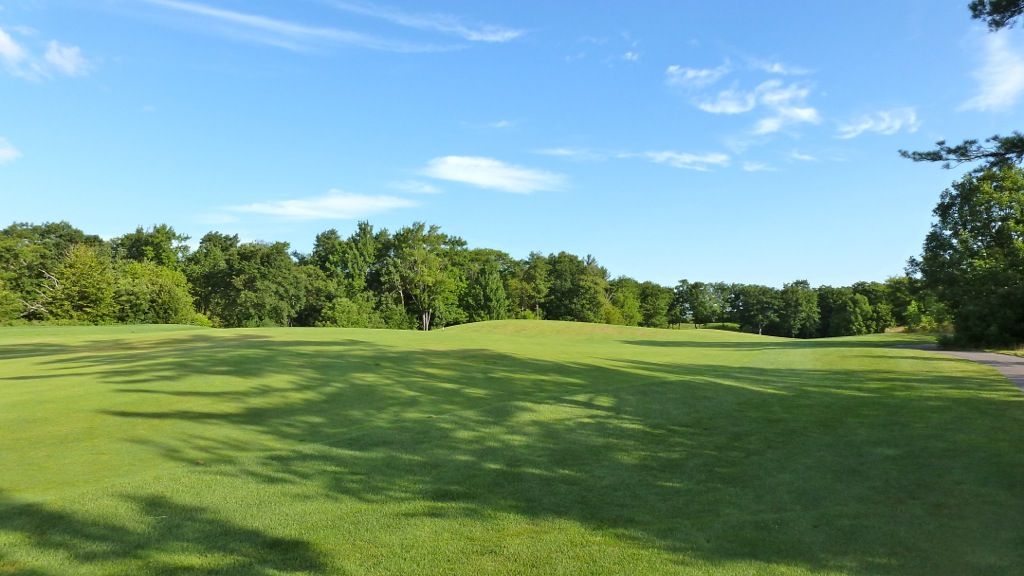
The journey continues at the 155 yard par-3 4th where birdies can be found, but misses right are lost and misses left might be worse than misses right

The 346 yard par-4 5th is among the best holes on the course. A semi-blind and downhill tee shot with only the green in view. Though some will be tempted to get as near the green as possible, the ideal play is an iron / fairway wood down the left side of the fairway, away from the Line of Instinct. From the left the golfer is rewarded with a clear look at the green from a flat lie; from the right the approach is uphill and over a deep bunker. The tee shot and approach from the left...


The very downhill 152-yard par-3 8th will be a favourite of many but I think it is prettier than it is a good golf hole. The bunkering left of the green is a real head-scratcher...

The 459-yard par-4 9th is another controversial hole. A very nice view from the tee may draw the golfer's attention away from the difficult tee shot. A cleverly place top-shot bunker on the right will have many golfers aiming farther left than is ideal. Tee shots must challenge the rock outcropping on the right as any tee shot left of centre will find a drop-off and approaches will be played from a very uneven lie.
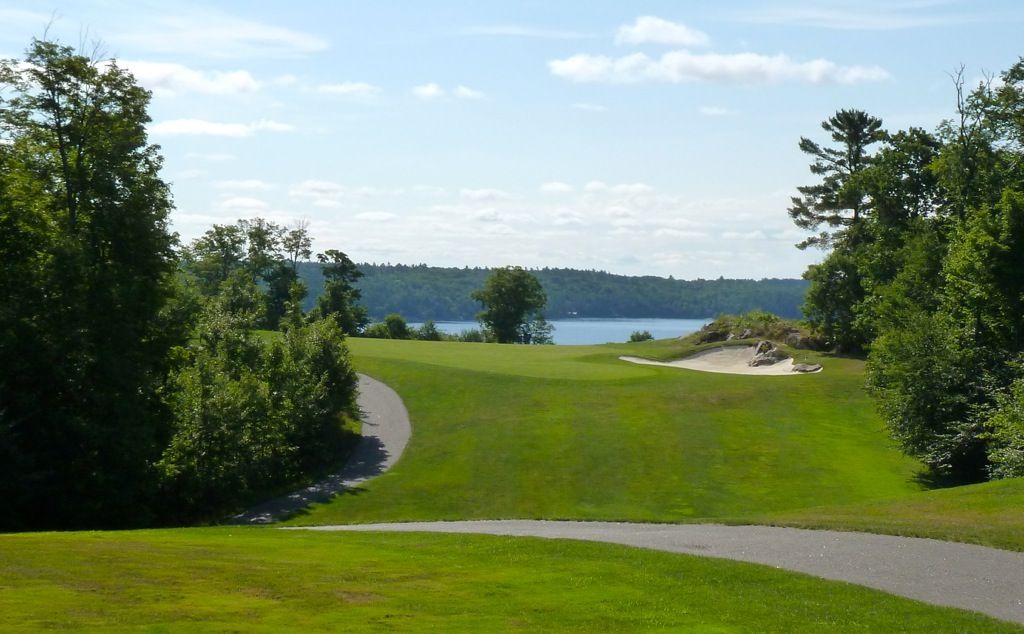
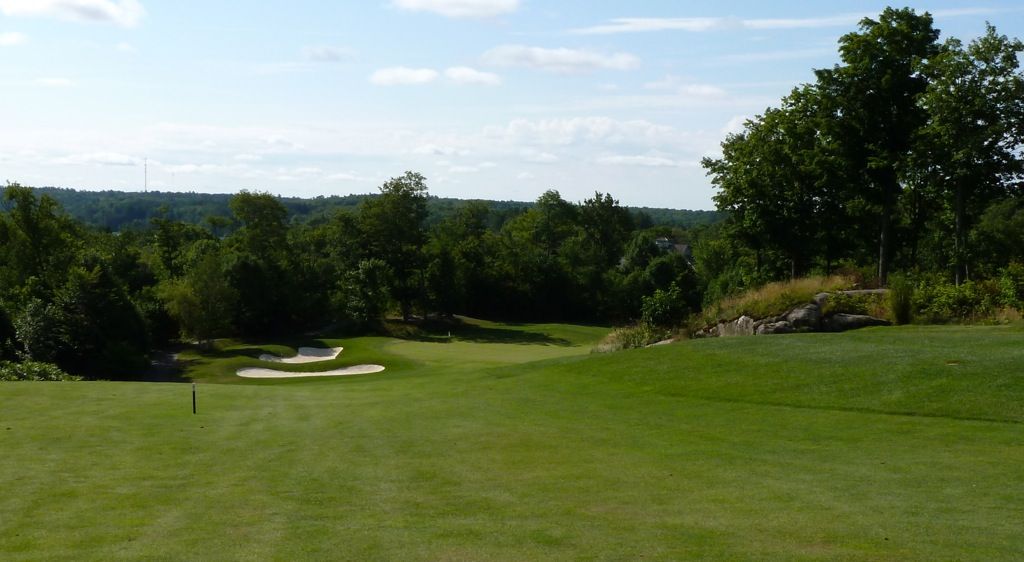

The 382 yard par-4 10th is another strong hole with a semi-blind tee shot and a green set hard against the forest on the right and perilously close to a severe drop-off left of the green.

The 11th and 12th holes are played over the flattest land on the golf course. At the 11th McBroom routed the tee shot around a hazard that must be crossed on both the tee shot and the approach.

The 12th is certainly the most forgettable hole on the golf course, playing straightaway and near 400-yards. Some decent forced perspective architecture on the approach though...

The 476 yard par-5 13th is the best hole on the golf course. Simple, strategic, and routed across some perfect terrain. There is plenty of room to bailout to the right though the ideal line is down the left. Brave/talented golfers can use the right-to-left tilted terrain to gain a boost in yardage. A hazard (same one as at the 11th) runs diagonally across the fairway 50 yards short of the green. Line and distance must be considered and executed upon both on a lay-up or an attempt at reaching the green in two. The shorter carry is on the left, and appropriately, misses to the left of the green are penalized by a severely left-to-right tilted green.

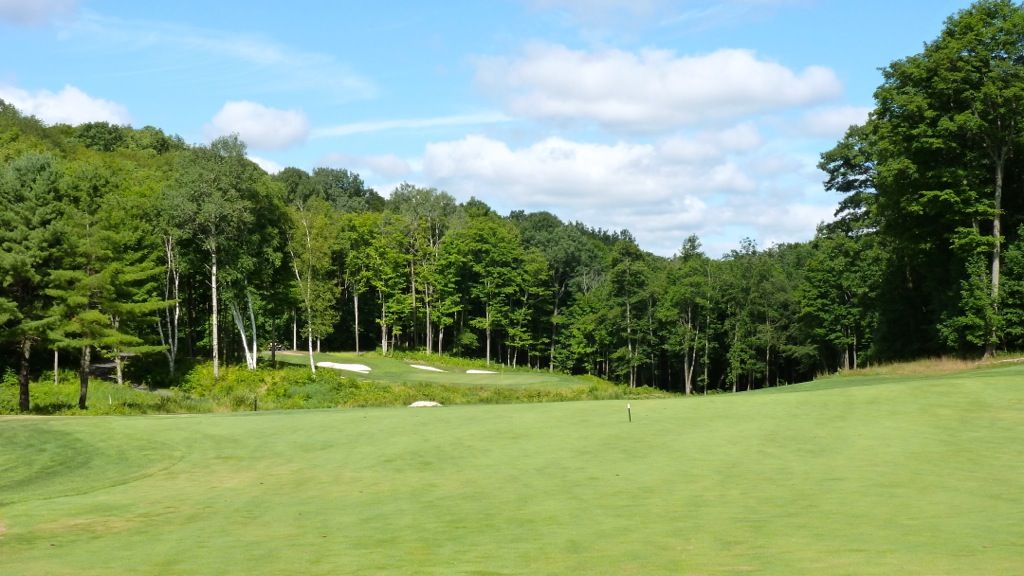

After downhill tee shots at the 14th and 15th the golfer is treated to, you guessed it, a downhill tee shot at the 16th. The driving zone is completely blind from the tee and most well-struck tee shots will collect to an area short of the water on the right. A quality green site here tucked neatly among rocks and forest.

The uninspiring 187 yard par-3 17th must evoke thoughts of 'haven't I seen this before' as it looks awfully similar to the 182 yard par-3 15th. Neither are great holes, though the 15th is certainly the better of the two.
The 18th, taken straight from the book of golf course architecture cliches, features a peninsula green guarded by the only lake on the golf course. The tee shot is a boring one played straightaway toward the lake; at 270 yards to the water this will be a lay-up for some. There was once fairway left of the rocks, creating a decision and some strategy on the tee shot; unfortunately, this has since been converted to rough.


lake joe is a beautiful course and a fair test of golf. agreed with your comments about 13, but i think you way underrate several holes in your high level review of the course. i've played the course a ton of times and live the Toronto area - there are but a few courses that are as well thought as this one.
ReplyDeleteThank you for the comment. I agree Lake Jo is both beautiful and fair and it's also fun (I make the effort to play there a couple of times every year). I think my review came off as overly harsh, focusing too greatly on the negatives.
ReplyDelete